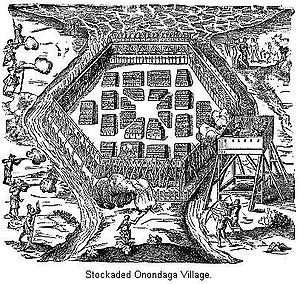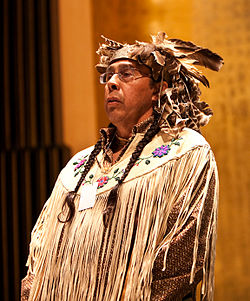- Onondaga people
-
For other uses, see Onondaga (disambiguation).
Onondaga Total population 80,000+ Regions with significant populations  United States (New York)
United States (New York) Canada (Ontario)
Canada (Ontario)Languages English, Onöñda'gega', Other Iroquoian Dialects
Religion Longhouse, Handsome Lake, Gai'hwi:io, Kanoh'hon'io, Kahni'kwi'io, Other Indigenous Religion
Related ethnic groups Seneca Nation, Oneida Nation, Tuscarora Nation, Mohawk Nation, Cayuga Nation, other Iroquoian peoples
The Onondaga (Onöñda’gega’ or the People of the Hills) are one of the original five constituent nations of the Iroquois (Haudenosaunee) Confederacy. Their traditional homeland is in and around Onondaga County, New York. Known as Gana’dagwëni:io’geh to the other Iroquois tribes, this name allows people to know the difference when talking about Onondaga in Six Nations, Ontario or near Syracuse, New York. Being centrally located, they were considered the "Keepers of the Fire" (Kayečisnakwe’nì·yu’[1] in Tuscarora) in the figurative longhouse. The Cayuga and Seneca had territory to their west and the Oneida and Mohawk to their east. For this reason, the League of the Iroquois historically met at the Iroquois government's capital at Onondaga, as indeed the traditional chiefs do today.
Contents
History
An early date for the Onondaga comes from attempting to date an oral tradition related to The Great Peacemaker, a Huron, who approached the Onondaga and others to found the Haudenosaunee.[2] The dates he lived are not fixed but when the Seneca nation debated joining the Haudenosaunee based on his teachings there is a tradition of a solar eclipse happening. The most likely eclipse for this event was in 1142AD which actually fell over the land of the Seneca.[3][4] Carbon dating of particular sites of Onondaga habitation shows dates starting close to 1200AD ± 60 years with growth for hundreds of years.[5]
In the American Revolutionary War, the Onondaga were at first officially neutral, although individual Onondaga warriors were involved in at least one raid on American settlements. After an American attack on their main village on April 20, 1779, the Onondaga later sided with the majority of the League and fought against the American colonists in alliance with the British. Thereafter, many Onondaga followed Joseph Brant to Six Nations, Ontario, after the United States was accorded independence.
On November 11, 1794, the Onondaga Nation, along with the other Haudenosaunee nations, signed the Treaty of Canandaigua with the United States, in which their right to their homeland was acknowledged by the United States in article II of the treaty.[6]
Those Onondaga remaining in New York are under the government of traditional chiefs nominated by clan mothers, rather than elected.
On March 11, 2005, the Onondaga Nation of Nedrow, New York, filed a land rights action in federal court, seeking acknowledgment of title to over 3,000 square miles (7,800 km2) of ancestral lands centering in Syracuse, New York. In doing so they hope to obtain increased influence over environmental restoration efforts at Onondaga Lake and other EPA Superfund sites in the claimed area. This lawsuit is facing a motion to dismiss based on the precedent established in the Cayuga nation's land claim [1] and other defenses.
 Sketch by Samuel de Champlain of his attack on an Onondaga village.
Sketch by Samuel de Champlain of his attack on an Onondaga village.
Notable Onondaga people
Wolf Clan, Clanmother
- Leon Shenandoah (1915–1996), Tadodaho
- Oren Lyons [Lives at Onondaga and holds a Faithkeeper title, but is Seneca]
- Sidney Hill
- Tom Longboat [Six Nations]
- Canassatego, Hiawatha, Tadadaho of the Iroquois Confederacy
- Tadodaho
Today
- Onandaga Nation in Nedrow, New York outside Syracuse
- Onondaga of Ohswegen and Bearfoot Onondaga, both at Six Nations of the Grand River, Ontario, Canada
Other spellings encountered
- Onöñda'gega' Onondaga language
- Onontakeka Oneida language
- Onondagaono Seneca language
See also
Notes
- ^ Rudes, B. Tuscarora English Dictionary Toronto: University of Toronto Press, 1999
- ^ Johansen, Bruce E. (2006). The Native peoples of North America: a history. Rutgers University Press. pp. 136–138. ISBN 9780813538990. http://books.google.com/books?id=yiKgBuSUPUIC&lpg=PA137&lr&as_brr=3&pg=PA136#v=onepage&q&f=false.
- ^ Johansen, Bruce E. (Fall, 1995). "Dating the Iroquois Confederacy". Akwesasne Notes New Series 01 (03/04): 62–3. http://www.uunia.org/pdf/Dating%20Iroquois%20Confederation%20%20Bruce%20Johansen.pdf. Retrieved 2010-05-23.
- ^ Johansen, Bruce Elliott; Mann, Barbara Alice (2000). "Ganondagan". Encyclopedia of the Haudenosaunee (Iroquois Confederacy). Greenwood Publishing Group. p. 105. ISBN 9780313308802. http://books.google.com/books?id=zibNDBchPkMC&lpg=PR7&ots=38pKjtTg_8&lr&pg=PA105#v=onepage&q&f=false. Retrieved 2010-05-23.
- ^ Tuck, James A. (1990). Onondaga Iroquois prehistory: a study in settlement archaeology (reprint ed.). Syracuse University Press. p. 197. ISBN 9780815625117. http://books.google.com/books?id=YeWHw-hTJfoC&lpg=PR11&ots=gI8mAtFtTJ&lr&pg=PA197#v=onepage&q&f=false.
- ^ 1794 Canandaigua Treaty Commemoration Committee, Inc.
References
- Calloway, Colin G. (2004). First Peoples (2nd Ed.). Boston: Bedford/St. Martin's. ISBN 0-312-39889-1.
- Onondaga Reservation, New York United States Census Bureau
External links
League of the Iroquois Nations Topics Groups African Americans · Asians · British · French · Germans · Greeks · Hispanics · Irish · Italians · Jews · Onondaga Indians · Pacific Islander's · Polish · Slavic · Ukrainians · WelshEthnic enclaves Institutions St. John the Baptist Greek Catholic Church · St. Peter's Italian ChurchRelated Categories:- Onondaga
- Iroquoian peoples
- Native American history of New York
- Native American tribes in New York
- Ethnic groups in Syracuse, New York
Wikimedia Foundation. 2010.

